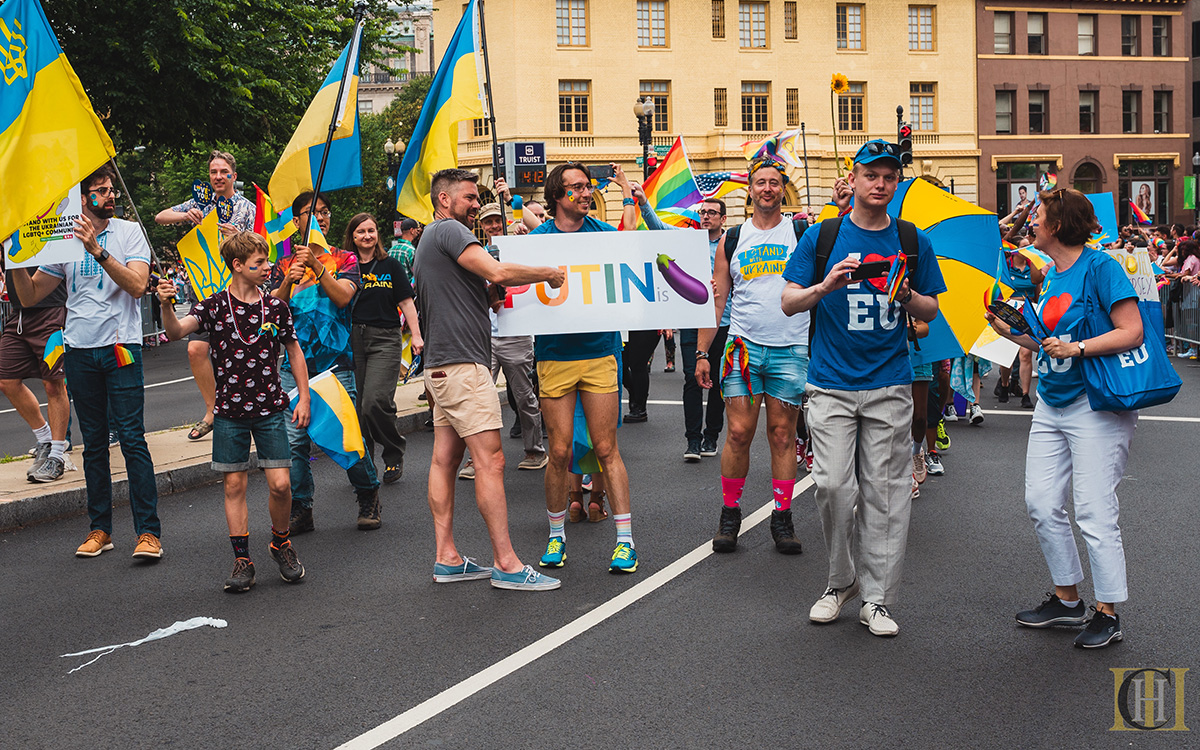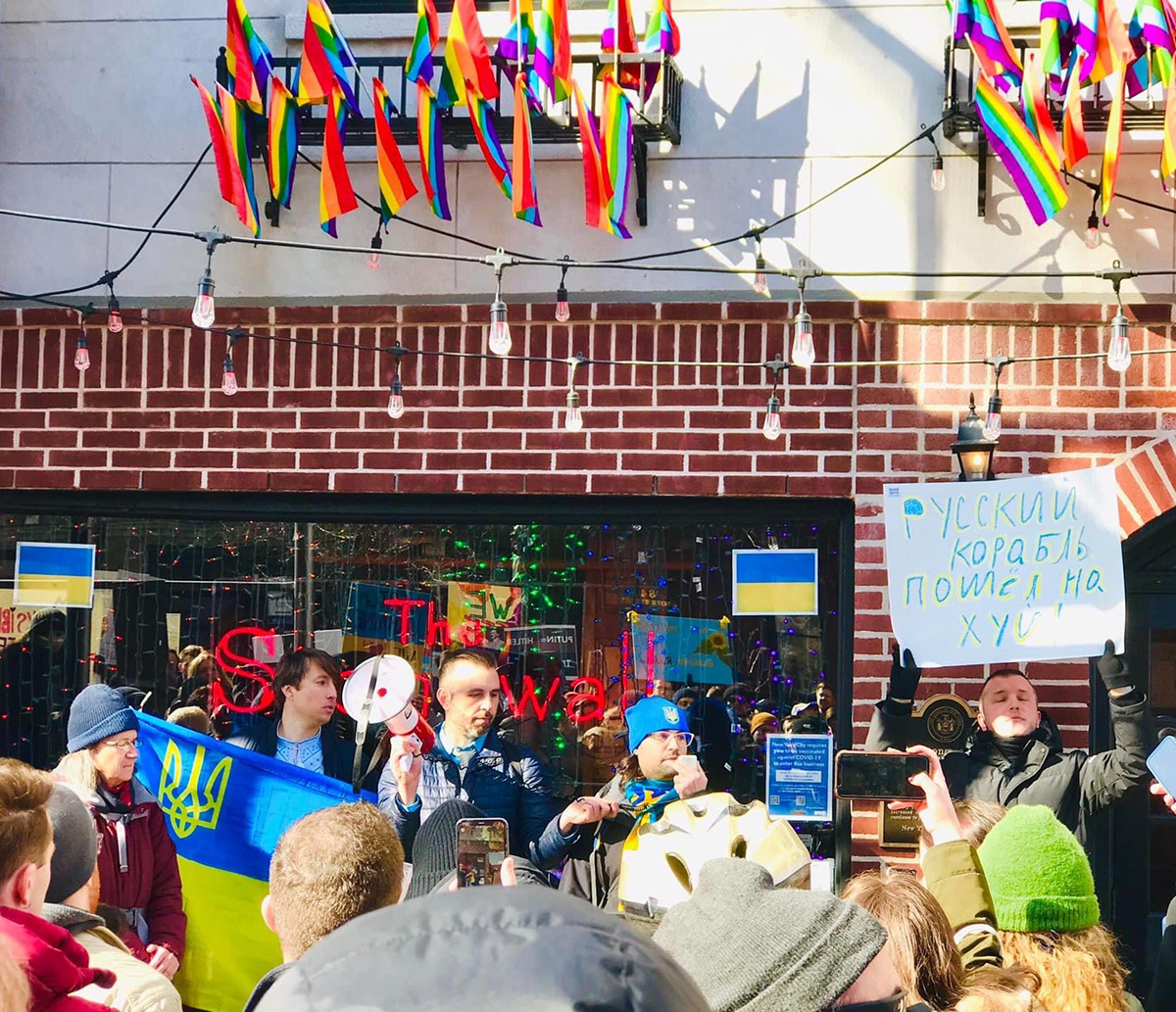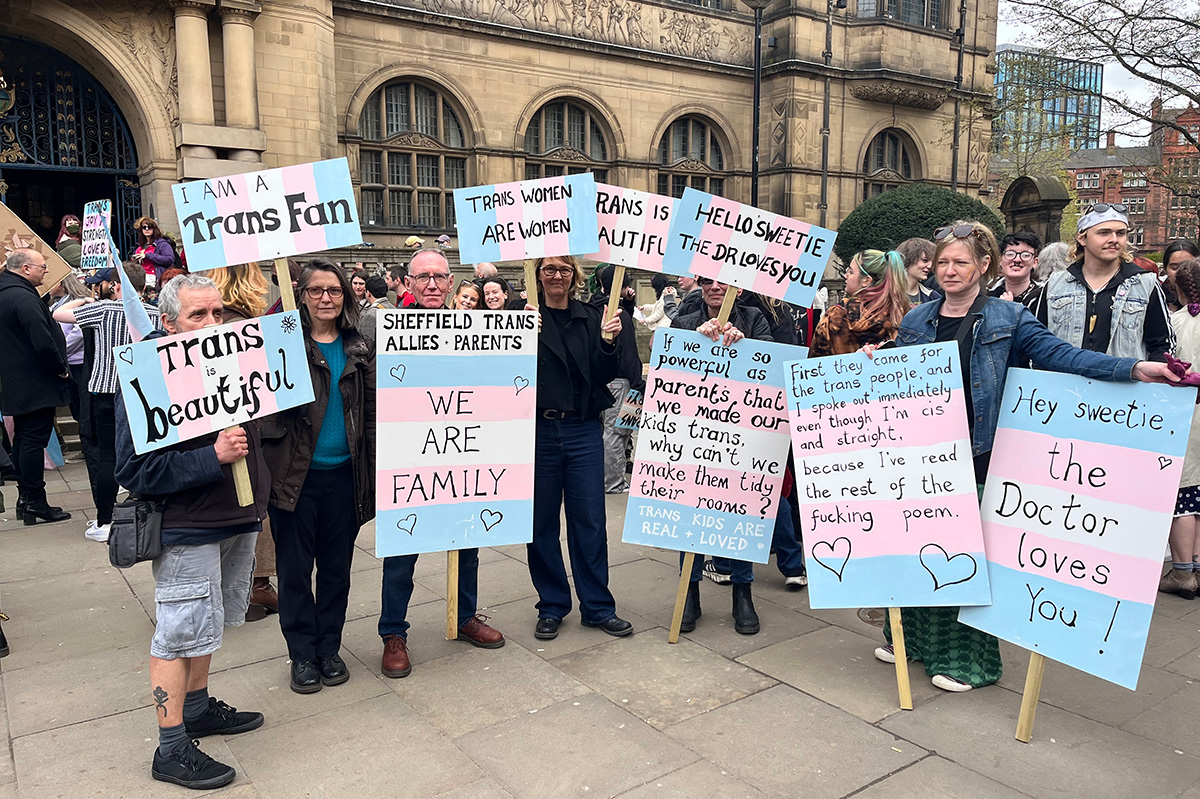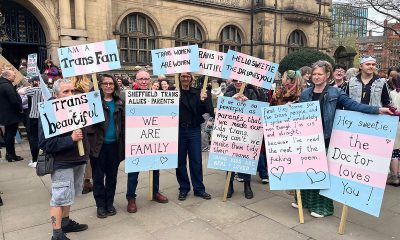Commentary
Stuck in limbo: Ukrainian government leaving LGBTQ community behind
Country saw years of steady progress before war began

BY BOGDAN GLOBA | “It’s not the right time.”
This is the most frequent response received when advocating for the LGBTQI+ community, but the truth is it is never a suitable time for changes or progress, or even for a discussion about human rights for minorities such as LGBTQI+ people. Since the Soviet Union collapsed in 1991 and the Ukrainian Republic regained independence, a lot of progress was made. For example, Ukraine was the first country out of the post-USSR ones that decriminalized punishment for homosexuality (the Soviet Union criminalized homosexuality with seven years of imprisonment or labor camp detention.)
In addition, following the Revolution of Dignity, when the Ukraine’s Parliament passed progressive anti-discrimination bills, later they passed the amendment to the labor code that protects from discrimination in the workplace based on sexual orientation and gender identity (SOGI). An important note: The new amendment to the labor code is still the most advanced in Europe, as many countries have adopted legislation protecting discrimination based on sexual orientation without including gender identity. Even the judicial branch made some contributions. Ukraine’s constitution in Article 24 bans discrimination in general; at the same time, it doesn’t have SOGI in the list, but instead has an open list. In May 2014, after two decades, the Supreme Specialized Court of Ukraine wound down legislative debates and published a constitutional review that interpreted the constitution as banning any form of discrimination, including based on SOGI.
Unfortunately, since 2016, Ukraine’s Parliament has stopped making any legislative progress towards equality for LGBTQI+ people, and all changes have moved to the government executive level. But, even though Ukraine has changed a lot culturally and politically, among the biggest and most crucial puzzles remains unsolved — same-sex marriages or, a bare minimum for the gay community, civil partnership.
Mission impossible (or not)
The biggest roadblock to same-sex marriage in Ukraine is the constitution.
Back in 1996, when the first version of the constitution was written, Ukrainian MPs limited the institution of marriage only to men and women, preventing any marriage debates for generations. The mission to change the constitution means the LGBTQI+ movement needs to elect a supermajority in the Verkhovna Rada (300 MPs out of 450) three times, the Constitutional Court needs to approve changes, and the president needs to sign the bill.
Other examples of stalled progress make the situation look even more bleak.
Bill 5488 was introduced in May 2021 as part of a long-term affiliation process with the European Union, and part of an Action plan for National Human Rights Strategy and many U.N. resolutions, including recommendations from the U.N. Human Rights Council. This bill would change the Criminal Code to clarify language in Article 161 to add hate crimes protections for LGBTQI+ persons and other marginalized groups.
Unfortunately, the bill was dead on arrival and never voted on in the Parliament, even though it would provide protection from hate crimes not only based on sexual orientation and gender identity, but also based on race, religion, color, language, gender and disability and many more. Broadening protections against hate crimes has broad support overall. Following threats on KyivPride’s march in 2016, even the Orthodox Church of Ukraine made a statement declaring the physical attack unacceptable.
Until now, the Ukrainian Parliament held down the “last fort” of traditional family values and didn’t move forward with legislation that included SOGI. Meanwhile, LGBTQI+ Ukrainians continue to lose trust in their government’s ability or desire to protect them. Only this year, the Human Rights Ombudsman reported 17 cases of hate crimes based on SOGI and only one verdict in the court. Human rights organizations may report hundreds more hate crime cases every year (Ukraine human rights organization Nash Mir Center reported 186 documented hate crimes based on SOGI in 2020), but still, without adopting Bill 5488 or similar legislation, there won’t be an effective system preventing these hate crimes and providing justice for minorities and marginalized groups.
Another existential challenge for the LGBTQI+ community will be adopting a civil partnership bill (as same-sex marriage is realistically not possible in the coming decades). “Preserving the institution of marriage” only for straight families, but letting same-sex couples have civil recognition, could let Ukraine join the ranks of other democratic and progressive countries, while appeasing some of the conservative sector’s demands. In most European countries, a civil partnership law was the middle step before same-sex marriages were fully recognized. That institution is long overdue and most needed in Ukraine right now, while thousands of LGBTQI+ are serving in the army with a civilian partner back at home. For straight couples, if something happens with a military partner (wounded or killed), a civilian partner will obtain a variety of government benefits, from cash support to housing. In the case of same-sex couples, they are invisible to the government and have no help or recognition. A civilian person has no right to even bury their partner’s body.
The Ukrainian government demonstrates insufficient desire to fix LGBTQI+ inequality
LGBTQI+ Ukrainians are equal enough to serve your country but not equal enough to get the same benefits of straight couples, or to receive adequate protections against hate crimes. The Union of the LGBT Military in Ukraine (a non-government organization) already includes a few hundred openly LGBTQI+ members and a thousand queer military who follow their activities. While they actively fight to protect the republic, they sincerely hope politicians and government have their back. And as many politicians repeat kumbaya about all Ukrainian soldiers being heroes, it does look like they believe LGBTQI+ heroes don’t need the same benefits or support as their colleague’s heterosexual ones.
Left behind
Historically, the most significant and quickest progress for the LGBTQI+ community in Ukraine has happened (2014-2016) in combination with a few factors: The process of joining a visa-free regime with the Schengen zone and integration into the European Union, the cultural revolution when Ukrainian start to watching more Netflix and Western media than Russian channel, and U.S. government investment of great resources to promoting democratic values, including many cultural and exchange programs which help to bolster civil society and the LGBTQI+ human rights movement in Ukraine.
Unfortunately, with the changing power in the White House in 2016, the U.S. government’s priority shifted dramatically, and the Ukrainian LGBTQI+ community was left with markedly less support in the fight for their civil rights with the Ukrainian government, at the same time fighting back against Russian anti-LGBTQ propaganda, the Russian orthodox church’s lobby, and rising right-wing organizations. To add insult to injury, a few representatives from the U.S. Congress came down to Kyiv to participate in a prayer breakfast and lobby for traditional family values, including banning “gay propaganda.” In fact, a group of U.S. congressmen who came to Ukraine’s parliament to lobby for a ban on “LGBTQI+ propaganda” was led by U.S. Rep. Juan Vargas (D-Calif.). The same Vargas, who is a member of the Congressional Equality Caucus, has a 100 percent score LGBTQI+ friendly rating by the organization Human Rights Campaign and is a member of the Democratic party (which by many press releases in favor of protection of the LGBTQI+ community abroad) who represents the greatest state of California. Until now, it was only a delegation representing the U.S. Congress and including member of Congressional Equality Caucus, which made a trip to Ukraine to talk about LGBTQI+ issues, but just sadly, they talk about the need to criminalize the queer community, not share experiences of how the U.S. navigated many discussions and made gay marriage possible in the U.S.
At the same time, the European Union is losing the opportunities to stand for the human rights for LGBTQI+ in Ukraine even though the European Commission and other institutions have a lot of tools in the box to be more actively advocating for equality. Unfortunately, integration into the EU does not require recognition of same-sex marriages, as the EU doesn’t regulate marriage standards for members, and after Ukraine passed anti-discrimination legislation and banned the bare minimum of protecting the LGBTQI+ community from discrimination in the workplace, European bureaucrats checked all boxes and lost political interest in any advocacy for the queer community.
The greatest example was a few weeks window in 2022 when the EU was considering Ukrainian application to become a candidate for a member of the European Union, and the Eurocommision passed to the Ukrainian government must to do list which included the ratification Istanbul Convention but failed to mention hate crime bill there, what was already in Parliament and ready to vote, even more — less sensitive and controversial then Istanbul Convention (religion organization was massively oppose ratification on affair “gender ideology” and actively pushing back in parliaments many years.)
The last miles of the equality marathon
Ukraine did make enormous progress toward equality for the LGBTQI+ community in the past. More than that; the newish Ukrainian society is much more tolerant, welcoming and friendly. In 2015, KyivPride had a few hundred activists — more than 10,000 people participated in the last one. Surprisingly, most of them were straight people. Ukraine has the biggest movement of LGBTQI+ soldiers in Europe, the larger parents of queer children movement and many more. The picture becomes even brighter if you look at the map and realize all regional countries are going backward on LGBTQI+ issues. Belarus and Russia criminalized homosexuality back in their wish to relive the Soviet Union. Still, even Poland has a free LGBTQI+ zone movement where some regional counties declare themself free from the LGBTQI+ community. On that background, Ukraine looks like the most promising and leading country in the region. Only the Ukrainian government took a nap on the last miles of a marathon.
How can we shake the Ukrainian government and help them stop lingering on the most essential legislation for the LGBTQI+ community, and end the inequality battle in Ukraine? We can start actively using our diplomacy again. For example, Congress can send a delegation to exchange experiences on how they pass the Marriage Equality Act. The White House and State Department can be more proactive in working groups for the implementation of the U.S.-Ukraine Charter on Strategic Partnership, which includes the Ukraine government’s obligation to pass the hate crime bill, The Department of Justice can organize education program for its Ukrainian counterpart and help them to learn from the U.S. experience on preventing hate crimes. And as we are a country with the largest number of LGBTQI+ envoys in the government per square foot, can we use them at least once for the greatest good?

LGBTQI+ as national security for the US
The important nuance that many experts miss is the LGBTQI+ issue in Ukraine and Eastern Europe (and even broader) is a more complicated issue than we think. One of the self-declared reasons Russia justifies its war and invasion of Ukraine is “traditional family values” and their preventing Slavic people from biting the forbidden fruit of GayEurope. When the Russian army took over Mariupol, the biggest TV story on the Russian government channels was a video of how they found the “US strategic center of gays and lesbians in Mariupol.” The fact is that was an office of the local non-government organization that works with USAID on humanitarian projects and happens to have some posters from KyivPride. But even this Russian crusade against liberal values in Europe is not so damaging as their professional disinformation, work, and influences on American society with a false narrative. Right at this moment, thousands of Russians somewhere in a troll farm in the Crimea are making sure for the millions of U.S. citizens in the coming election, the most important issue will be what restroom to choose instead of social security reform.

Nina Jankowich, an expert on government strategic communication, in her book How to Lose the Information War gave a few examples of Russian misinformation campaigns that started in Ukraine but had real consequences on the US presidential election in 2020. She asks a question in her book: “The U.S. and the Western world have finally begun to wake up to the threat of attack from Russia … what can the West do about it?”
From my perspective as a Ukrainian by birth, American by choice, and gay by nature, the answer is simple: What if we start not talking about values but implementing them? What if, bit by bit, we will all be together to fight for democratic values and principles? And maybe Russians will never choose another matrix, but our matrix will be stronger and more resilient to the “Evil Empire.”
Bogdan Globa is the president and co-founder of QUA – LGBTQ Ukrainians in America, a former assistant to the Human Rights Committee chair in the Verkhovna Rada (2014-2016) co-founder and CEO of Fulcrum (2012-2016), an LGBTQI+ organization.
Commentary
A conversation about queers and class
As a barback, I see our community’s elitism up close

In the bar, on the way to its now-Instafamous bathrooms, there’s a sign that reads, “queer & trans liberation means economic justice for all.”
I remember seeing that sign the first week the bar opened, and ever since I often find myself reflecting on that message. I stand fully in agreement. That’s why laws protecting queers in the workplace are essential, for far too often we are targeted otherwise. It’s also why I love working at the bar, since it provides opportunities for queers from all over the spectrum to earn a living. At a time when I gave myself space to pursue art, it was the bar that enabled me to do so.
It’s one thing to support the LGBTQ community in spirit, but that spirit means jack in a capitalist society if viable economic opportunities don’t exist. Speaking of jack, there’s a fellow barback named Jack who I fangirl over often. Jack is a decade younger than me, but damn I wish I had his sex appeal at his age (or any age, for that matter). He also has a mustache that easily puts mine to shame.
Jack not only agrees but took things one step further. “Economic inequality IS a queer issue,” he told me, “especially as we move into the most uncertain period of American politics I have ever lived through, it is apparent our identity is now a fireable offense.”
Uncertain is right. We’re fresh off the heels of a trade bonanza, one caused for literally no reason by our current commander in chief. Yet there emerged a strange division when discussing the trade war’s “unintended” consequences. For working class comrades like Jack and myself, we’re stressed about increasing prices in an already tough economy. But the wealthier echelons of our country had something else on their mind: the spiraling stock market. This alone highlights the story of our economic divide, where the same event produces two separate concerns for two distinct classes.
This is not to say the stock market is not important, but sometimes the media forget many Americans don’t own stock at all, including a vast majority of people between 18 and 29. In fact, according to Axios, the wealthiest 10 percent of Americans own 93 percent of the entire stock market, with the richest 1 percent holding $25 trillion — that’s right, trillion with a “t” — in market value. So, when the president reversed course on trade, it was less about high prices hurting everyday Americans and more about the dent created in the wealth of the wealthiest. And I’ll admit: that bothers me a lot.
If there is any takeaway from Trump’s trade war, it should be this: Economic inequality is the highest it has been in decades and, if left unchecked, will destroy the fabric of our country. We are steadily moving toward oligarchy status—if we’re not there already, that is—and it seems to grow worse with each passing year and administration. But in a city of D.C. gays who often skew corporate, I wonder: Are we all on the same page here?
After becoming a barback, I have my doubts. From questions about what else I do, to comments encouraging me to work hard so that I can be a bartender one day, I quickly learned the gay world is not too fond of barbacking. Barebacking, sure, but not barbacking. And hey, I get it—we’re not the alcohol hookup at the bar. Still, we are part of the service industry, and while some people are incredibly kind, you’d be surprised at how many turn up their noses at us, too.
Recently, I’ve come to realize my class defines me as much as my orientation does, if not more. Naturally, when you come from a rough neck of the woods like I do, it’s easy to feel out of place in a flashy city like D.C., which Jack noticed, too. “Anyone from a working class background could testify to that,” he said. “I don’t really know anyone from true upper class backgrounds, but I’d imagine their experience is one that leans into assimilation.”
Assimilation is a key word here, for admittedly gays love to play with the elite. Often, we don’t have children, meaning more money for the finer things in life, but that also means we may not think about future generations much, either. I’ve written before that our insecurity growing up has us ready to show the world just how powerful gays can be—power that comes in trips to Coachella and Puerto Vallarta, or basking in the lavish houses and toys we own. There’s already a joke that gays run the government, and corporate gays kick ass at their jobs as well. So, given the choice between fighting inequality and keeping a high-paying job, I must admit I have a hard time seeing where D.C. gays stand.
Admittedly, it worked out in our favor before, given that many corporations catered to our economic prowess over the years. But look at what’s happening now: Many corporations have kicked us to the curb. Protections are being stripped from queers, particularly for our trans brothers and sisters. Law firms are bowing down to Trump, offering hundreds of millions in legal fees just for their bottom line. All of this will hurt both queers and the working class in the long run, so again I ask: Corporate gays, where do you stand? Because if you remain complicit, that’s bad news for us all.
I don’t want to sound accusatory, and I hate being a doomsday type, so allow me to end this on a better note. Strength is not about celebrating when times are good. Arguably, true strength emerges when times get tough. These are tough times, my friends, but that also makes now the perfect opportunity to show the world just how strong we are.
At a time when the world is pressuring us to turn our backs on each other, we must defy them to show up when it counts. Corporate gays—now more than ever, at a time when the economy is turning its back on queers, we need you. We need you to stand up for the queer community. We need you to make sure no one gets left behind. We need you to show up for us, so that we can show up for you, too.
Ten years ago, the economy didn’t turn queer out of nowhere. The economy turned queer because we made it turn queer.
And if we did it once, surely we can do it again.
Jake Stewart is a D.C.-based writer and barback.
Commentary
Fight against TERFs goes global
UK Supreme Court on April 17 ruled legal definition of ‘woman’ limited to ‘biological sex’

After last week’s U.K. Supreme Court ruling that reduced the legal definition of “woman” to “biological sex,” footage of a group of women celebrating the decision with champagne spread virally across the media. These women are known as trans-exclusionary radical feminists, or TERFs.
In response, thousands of transgender people and their allies — including parents, siblings, and pro-trans celebrities — flooded the streets of London, Sheffield, Manchester, Cardiff, and other cities across the U.K. on April 19, to protest the erosion of trans rights. The fight between TERFs and trans* people have become more visible to those outside of the British LGBTQ+ community.
But this isn’t just about the U.K. The problem has gone global. For me, as an openly trans person who has lived in four different countries, it feels deeply personal.
For years, British TERFs have been spreading misinformation about gender around the globe, collaborating with far-right politicians and inspiring anti-trans violence.
At a pro-trans protest I attended in Sheffield, one of the speakers, Sofia Alatorre, a trans woman from Mexico now living in the U.K., dedicated her speech to the ways British TERFs, with their powerful movement supported by celebrities, such as “Harry Potter” author JK Rowling, are influencing people in South America.
“When I go to Mexico now, I don’t just hear people talking about transsexuals as degenerates anymore. Instead I hear about what bathroom we should use, or whether we belong in sports,” Sofia told the Washington Blade. “These are not lines that come from Mexico. They are finely crafted narratives designed to drive a wedge by weaponizing ‘common sense’ gut reactions to complicated subjects. Because without these, they’d have to face the uncomplicated reality: We are just people trying to live our lives happily. In the U.K., the entire media infrastructure is sympathetic with ‘gender critical’ TERF ideology to the point that sympathy blurs into outright support. With these lines finding footing in the Global South, it seems clear that the U.K. has become an exporter of transphobia.”
Unfortunately, TERFs even showed up at a trans event, attempting to argue with the speakers.
One of the trans* organizers of the Sheffield demonstration, who preferred to remain anonymous, expressed their love for the trans* community and trans* people. They emphasized that they are not expressing hatred toward TERFs — they simply want them to reconsider their position.
“If you’re a TERF and reading this, we don’t hate you,” they said. “We don’t hate you. There is nothing I hold in my heart but deep pity for you. You do not know the community of love that we have as transsexuals, and you only know your community of hatred. If you are tired of feeling nothing but hate, come and talk to us, we’re nice, I promise. This protest is a rallying cry that we can’t lose, that we are all here for each other, and that we can do whatever the f*ck we want when we work together. We may be out here today in rage, but what keeps us alive is love.”
But it doesn’t seem like TERFs are ready to show love toward trans people — or to see trans women as their sisters. At our local protest in Sheffield, they were so agitated, jumping toward speakers and trying to engage with them, that the police had to intervene and remove them to prevent a fight. It reminded me of TERFs’ behavior I encountered in St. Petersburg, Russia, and in Russian-language online spaces.
Unfortunately, it’s not just South America that has been influenced by UK TERFs. The country I currently live in is known within European and U.S. queer communities as “TERF Island.”
Some trans Americans even avoid traveling to the U.K., afraid of the influence that Rowling holds over millions due to her wealth and cultural impact.
In Russia, Ukraine, and other Eastern European countries, so-called “radical feminism” is the most prominent feminist movement. Radical feminism, which emerged in the 1960s, is based on the belief that patriarchy is the root of all other forms of oppression.
In modern Eastern Europe, this has led to a situation where many feminists fail to acknowledge racism, ableism, and transphobia — excluding everyone except cisgender people, Slavic, atheist, and able-bodied people from their movement. Historically, radical feminists have not focused much on the trans* community, but with the rise of trans* activism in the 2000s, many became fixated on targeting trans people.
Many of my Russian-speaking trans friends have been badly bullied by local TERFs. Some even experienced suicidal thoughts and severe anxiety due to online harassment from them. And these TERFs weren’t developing their ideology locally — they were importing it. The anti-man rhetoric was inherited from American prominent radical feminists like Andrea Dworkin and Ti-Grace Atkinson, while the transphobic elements were “exported” to Eastern Europe, primarily from the U.K. and specifically Scotland.
Even before Rowling, there was Magdalen Berns, a Scottish TERF YouTuber who was extremely popular among Russian girls and women. It was Berns who helped bring Rowling into anti-trans activism.
I spoke with Sophie Molly, a Scottish trans activist and politician who ran as an Independent MP candidate in the 2024 U.K. general election for the Aberdeen South constituency.
TERFs ruthlessly harassed her during her campaign.
“Transphobia is institutionalized in the UK. It is systemic and it’s getting worse with each passing day” she told me. “Local TERF have a slew of legal professionals on their team too. Like Sarah Phillimore and Joanne Cherry. TERFs have been continually lobbying the government to oppress trans and gender non-conforming people. Dragging their rights and freedoms through the courts. All under the pretense of protecting the rights of women. In reality these conservative groups are backed and funded by billionaires. Billionaires that want to remove trans people from public life, due a personal prejudice they hold. The majority of TERFs are wealthy and privileged white women. Most of them are not LGBTQIA+. They have obscene amounts of money to spend on persecuting a tiny minority. Trans women are women — no matter what the U.K. Supreme Court dictates.”
But another problem of TERFs is that they are policing women as well. Even the Supreme Court decision targeted women.
“The [Supreme Court] decision is an attack on the rights of both trans people and women,” Sophie said. “It reduces women to their anatomy, which is extremely regressive and misogynistic in my opinion”
Women for decades have fought to ensure their lives wouldn’t be defined by the sexual organs they were born with. TERFs are now doing exactly that — attempting to reduce womanhood to biology, while also dictating how women should behave, all in the name of “sisterhood.”
Modern British TERFs have received support from figures like musician, far-right influencer, and convicted murderer Varg Vikernes, as well as ultra-conservative organizations such as the Russian Orthodox Church, an institution notorious not only for justifying the war in Ukraine with homophobic rhetoric but also for its long history of opposing women’s rights. This kind of “feminism” is a global threat, not only to trans* people but also to girls and women everywhere.
Editor’s note: The author uses trans* in order to be inclusive of nonbinary and gender queer people.
Commentary
America’s detransition: The far-right’s coordinated attack on climate policy and trans rights
Progress framed as ‘mistake that must be undone’

What if the far-right’s endgame isn’t just stopping progress, but erasing it altogether? From banning trans healthcare to reversing climate policies, they aren’t just resisting change — they’re trying to force the world back into an imaginary past that never existed.
Across climate policy and trans rights, the right isn’t just opposing change — it’s actively detransitioning America, unraveling progress under the guise of “common sense” and “restoring order.” But this isn’t just about ideology. It’s about power.
From pulling out of the Paris Agreement to banning gender-affirming healthcare, the right has perfected a political strategy that frames progress as a mistake that must be undone. Whether it’s climate action or trans visibility, any step toward justice is framed as dangerous, unnatural, and in need of correction.
And if we look closer, these attacks aren’t just similar — they are deeply connected. By comparing the right’s climate rollbacks and its war on trans rights, we can see a broader strategy at work: One that fuels fear, manufactures doubt, and ultimately serves the interests of those already in control.
The fight isn’t just about policy. It’s about who gets to belong in the future.
The manufactured crisis: Who profits from reversal?
To justify rolling back both trans rights and climate protections, the right leans on manufactured crises — presenting change as a dangerous social experiment gone wrong. And the most effective way to do that? Weaponizing doubt.
Take climate change. Despite overwhelming scientific consensus, climate denialists cherry-pick uncertainties — using rare instances of changing climate models to cast doubt on the entire field.
Similarly, the right has latched onto detransition stories, amplifying a handful of cases where individuals regret transitioning to suggest that all trans people will regret their identities.
By focusing on individual regret rather than systemic realities, these movements create the illusion that climate action and trans healthcare are harmful mistakes rather than necessary progress. The message is clear: We must “correct” these wrongs by detransitioning the country back to a time before this supposed damage occurred.
But who actually benefits from this rollback?
- Fossil fuel companies profit from climate skepticism, ensuring we remain dependent on dirty energy.
- Right-wing politicians fundraise off anti-trans fearmongering while avoiding economic issues that might actually improve people’s lives.
By making people believe they are “fighting back” against elites, the right obscures the actual elites profiting from this manufactured outrage.
The spectacle: Turning trans lives and climate policy into distractions
None of this would work without media spectacle. Right-wing politicians and media outlets know that the most effective way to keep people from questioning power is to keep them emotionally invested in a performance.
Take the far right’s obsession with trans youth. They flood the airwaves with panic over puberty blockers, despite the fact that gender-affirming care is exceedingly rare.
A peer-reviewed study analyzing private insurance claims found that out of more than 5 million adolescents ages 8 to 17, only 926 received puberty blockers and 1,927 received hormone therapy between 2018 and 2022.
Similarly, climate policies are attacked as elitist schemes to control the working class — painting green energy initiatives as an attack on personal freedom, just as gender-affirming care is framed as an attack on children.
By shifting the focus onto symbolic enemies — the “radical trans activist” or the “climate elitist” — the right gives people someone to hate while avoiding the real sources of economic and environmental crisis.
And this isn’t just a cultural strategy. It’s a business model.
Capitalism is in the business of creating problems, then selling solutions.
- Oil companies push carbon capture technology while continuing to pollute — ensuring the crisis is never fully solved, only managed.
- The right promotes “detransition support” while banning trans healthcare, creating a crisis where one didn’t exist.
Both strategies ensure that nothing actually changes, while making people feel like they’re participating in a fight for freedom.
It’s a distraction, and it’s working.
Nature as a battleground: The far-right’s fear of fluidity
At its core, the war on trans people and the war on climate action stem from the same fear: The fear of change.
Queer ecology tells us that nature itself is fluid, adaptive, and in constant transition. Yet, the far-right insists on rigid, binary categories:
- Man/Woman.
- Fossil Fuels/Renewables.
- Traditional/Disruptive.
In both cases, fluidity is framed as unnatural — something that must be controlled through political intervention.
- Fossil fuels are labeled “natural” energy, while renewables are framed as “forced” and “unnatural”—a rhetorical tactic explored in a 2025 study on far-right climate discourse.
- Trans identities are labeled “unnatural choices,” requiring government bans to prevent people from making “mistakes.”
But what’s truly unnatural? The attempt to freeze society in time. The climate has always changed. Gender has always been fluid. The far-right isn’t defending nature — they’re defending control.
The far-right’s detransition obsession mirrors climate rollbacks
Capitalism is not interested in actual progress — it only cares about control.
The obsession with detransition mirrors climate rollbacks in that both are framed as necessary corrections to a mistake.
- The Paris Agreement withdrawal was presented as a return to “energy independence.”
- Trans bans are framed as returning to “biological reality.”
But the goal isn’t returning to a real past. It’s about constructing a version of the past that justifies present oppression.
- Climate denial isn’t about scientific debate — it’s about maintaining corporate power, as Time reported in 2025.
- Anti-trans laws aren’t about protecting kids — they’re about enforcing gender hierarchies, according to a 2025 New York Times editorial.
Neither of these rollbacks is accidental. They are part of a deliberate strategy of control — one that tells us that progress is always temporary and can always be reversed.
Who owns the future?
If we allow the right to detransition America, we risk a world where progress is always reversible, and power remains in the hands of those who benefit from disorder and fear.
The real question isn’t whether these issues are linked — it’s why they were ever separated to begin with. The fights for climate justice and trans rights are one and the same:
- A fight against the illusion of permanence.
- A fight against manufactured crisis and controlled reversal.
- A fight for a future that actually belongs to all of us.
So what do we do?
- We must refuse to accept their manufactured doubt — trans rights and climate action are not mistakes that need fixing.
- We must reject their false nostalgia — there is no past to return to, only a future to create.
- And most importantly, we must recognize that these struggles are connected.
If we fail to see this, we risk allowing reactionary forces to shape the future. But if we understand their playbook, we can disrupt the spectacle and refuse to let them dictate what comes next.
Because this fight isn’t about going back. It’s about moving forward — and making sure no one can take that future away.
Cody Hays is a Ph.D. student at Arizona State University’s Walter Cronkite School, researching media psychology, public understanding of science, and digital misinformation, with a focus on ideological worldviews; they are a Graduate Research Fellow in the MIDaS and Views and Values Labs, executive editor of the Journal of Public Interest Communications, and a nonprofit communications strategist with over a decade of experience in combating disinformation and mobilizing action.
-

 Federal Government2 days ago
Federal Government2 days agoHHS to retire 988 crisis lifeline for LGBTQ youth
-

 Opinions2 days ago
Opinions2 days agoDavid Hogg’s arrogant, self-indulgent stunt
-

 District of Columbia2 days ago
District of Columbia2 days agoD.C. police seek help in identifying suspect in anti-gay threats case
-

 Opinions2 days ago
Opinions2 days agoOn Pope Francis, Opus Dei and ongoing religious intolerance












